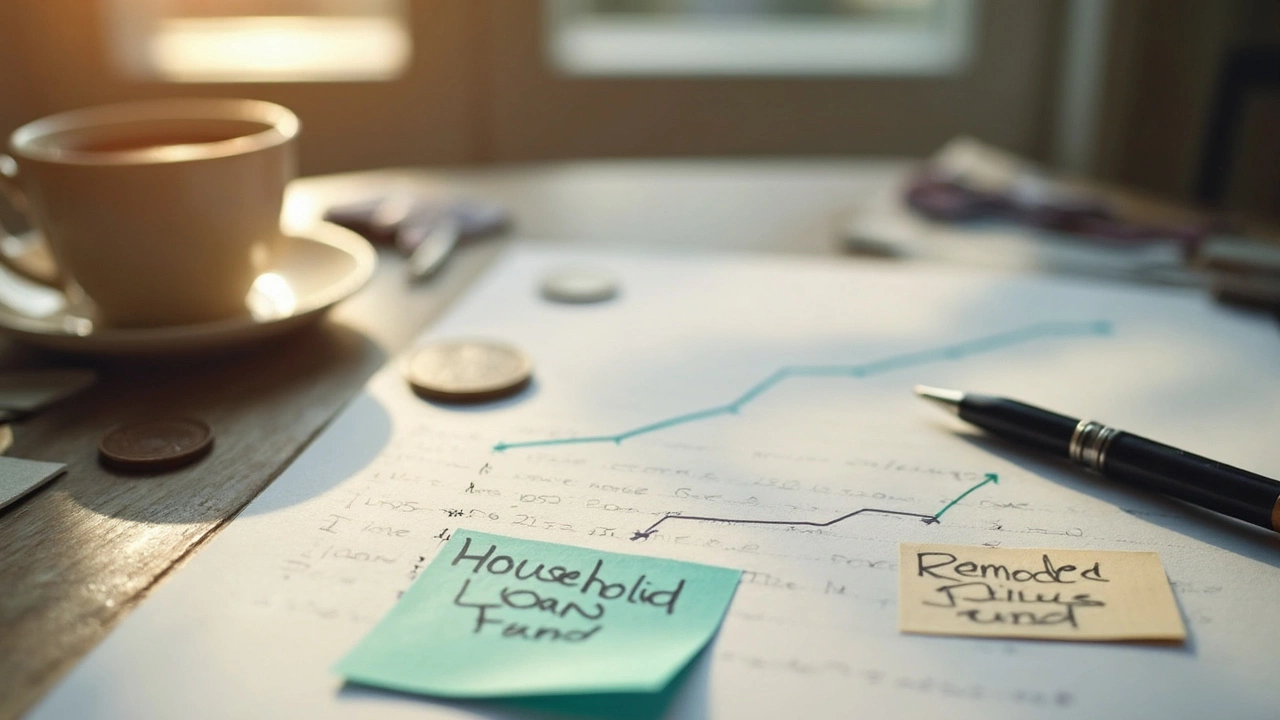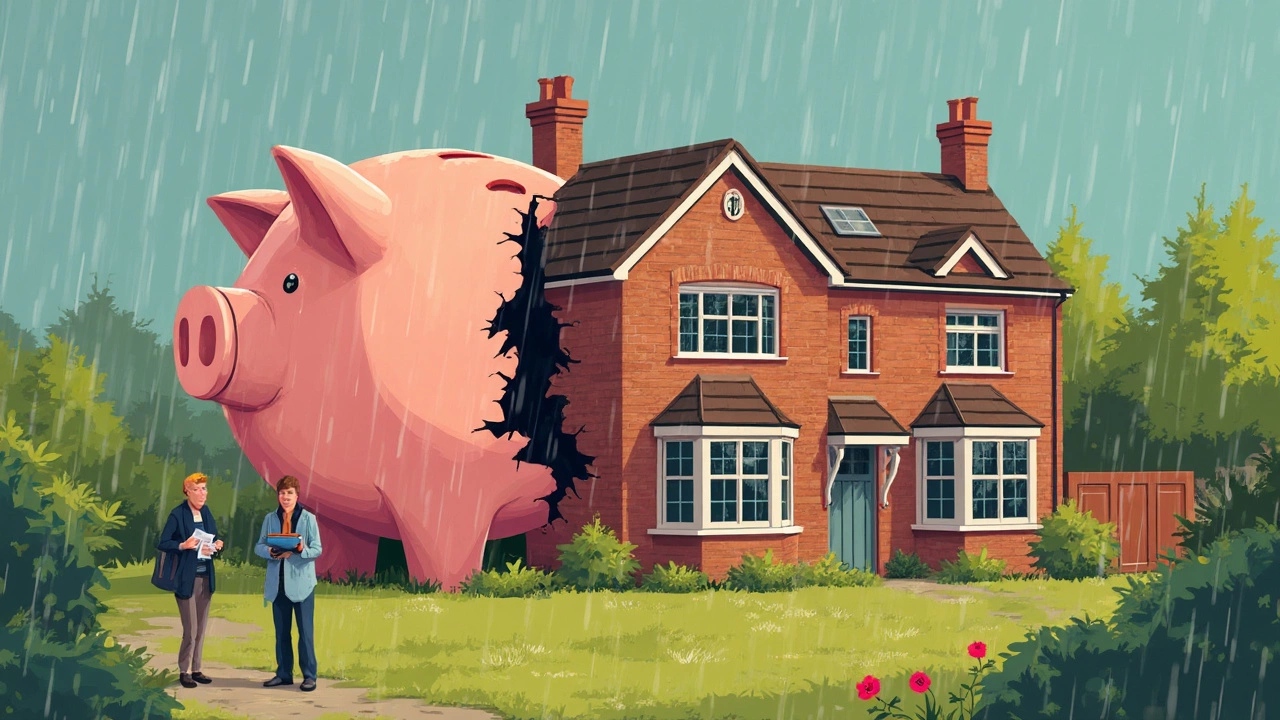Thinking about using your house to get some cash? It sounds simple: you’ve got all this value locked up in your home, and a home equity loan lets you pull some of that out. Just remember, there’s one huge downside people overlook—miss your payments, and you risk losing your place altogether.
This isn’t just about a high interest bill. With a home equity loan, your home becomes the collateral. Fall behind, and foreclosure isn’t just a scary word on paper. It can really happen, even if you’ve spent years turning that house into a home for your family. The numbers get personal—like when my buddy Dan lost his job and suddenly the monthly loan payment was too much. Before he knew it, the bank was on his back, and he had to scramble to find a way out.
So, before signing up, ask yourself: Is your income steady? Are you sure you’ll be able to keep up when life throws a curveball, like job cuts or car repairs? That’s the real catch. You’re betting your roof, not just your credit score.
- How Home Equity Loans Work
- The Major Disadvantage: Putting Your Home On The Line
- Real-World Examples: When Things Go Wrong
- Hidden Costs and Budget Impacts
- Tips To Borrow Safely and Alternatives
How Home Equity Loans Work
Alright, if you’re sitting on a paid-off chunk of your house, a home equity loan lets you cash out some of that value without selling. Here’s the deal: you borrow against the equity you’ve built—the difference between what your house is worth and what you still owe on your mortgage. It’s kind of like using your house as an ATM, but with a catch. If you can’t pay it back, you don’t just lose money; you could lose your house.
Banks usually lend up to 80% of your home’s value, taking your remaining mortgage into account. For example, let’s say your home’s worth $400,000, and you still owe $200,000. If the bank offers 80% of your home’s value, that’s $320,000. Subtract what you owe, and you could borrow up to $120,000.
| Home’s Value | Owed on Mortgage | Max Loan (80%) | Possible Equity Loan |
|---|---|---|---|
| $400,000 | $200,000 | $320,000 | $120,000 |
When you sign up for a home equity loan, you get one lump sum and pay it back with regular monthly payments, usually over 5 to 30 years. The interest rate is often fixed—so the payment doesn’t change, which is good for budgeting.
Here's the part folks love: interest rates on home equity loans are usually lower than rates for credit cards or personal loans, since your house backs up the debt. On top of that, sometimes the interest you pay can still be tax deductible if you use the money for home improvements. But don’t count on this without talking to a tax pro—the rules keep changing.
“The golden rule for home equity loans: don’t borrow more than you need, and never use your house as a piggy bank for splurges you can’t afford,” advises Linda Stern, a longtime personal finance journalist at Reuters.
The whole process isn't instant. You’ll need an appraisal, proof of income, and good credit to qualify. There will likely be fees, too: closing costs, appraisal charges, and even possible early payment penalties to think about. It’s worth asking for a breakdown before you get too far.
If you’re eyeing a home equity loan, make sure you understand every piece before you jump in. Don’t be shy about grilling your lender. This is a big deal—you’re literally putting your house on the line.
The Major Disadvantage: Putting Your Home On The Line
Here's the real heart of the matter: when you take out a home equity loan, you’re making your house the safety net for the bank. If you can't make your monthly payments, it’s not just your credit that's at stake. You could actually lose your home to foreclosure—no joke. That's a way bigger risk than most other types of loans, like a personal loan or using a credit card. The bank has the legal right to take your house if things go south.
This isn’t some far-off possibility. The Federal Reserve reports that homeowners who default on their home equity loan can find themselves starting foreclosure proceedings in as little as 120 days. The numbers are sharp: during tough times, like in 2008, thousands of real families lost their homes specifically due to missed payments on these loans. You might have poured years into building equity—one rough patch, and a loan can wipe that away.
What makes this different from other borrowing?
- If you fall behind on your car payment—worst case, you lose the car. Here, it’s your actual home.
- Personal loans aren’t tied to your house, so missed payments hurt your credit, but don’t risk your shelter.
- Credit cards get shut off; banks can’t make you leave your house over missed Visa bills.
The danger is real. Lenders can and do take action pretty quickly if you default. Here’s what happens if you can’t pay your home equity loan:
- Late fees start piling up right away.
- Your credit score drops after just one missed payment.
- The bank begins foreclosure steps.
- You could lose all the built-up value and equity in your home.
| Loan Type | Risk of Losing Home | Credit Score Impact |
|---|---|---|
| Home Equity Loan | High | High |
| Credit Card | None | High |
| Personal Loan | None | High |
That table spells it out: with a home equity loan, the biggest downside is clear as day. If you mess up, it’s your home that's on the chopping block. For folks who rely on their house as more than an asset—like a roof over your family’s head—the risk is heavy. Make sure you’re totally comfortable with betting your house before signing those papers.

Real-World Examples: When Things Go Wrong
When folks look at a home equity loan, they're often thinking about fixing up the kitchen or wiping out high-interest credit card debt. But let’s talk about what can really happen if things go sideways. It’s not just scary talk—plenty of families have faced real trouble here.
During the 2008 housing crisis, for example, thousands of people who took out home equity loans saw the value of their homes drop fast. Suddenly, they owed more than their houses were worth. This is called being “underwater.” If you lost your job or got hit with big medical bills, making payments could go from “tight but doable” to “impossible.” Foreclosures shot up, and people lost homes they’d spent years paying for.
| Year | Foreclosures from Home Equity Loans |
|---|---|
| 2006 | 85,000 |
| 2008 | 188,334 |
Take someone like Rita in Phoenix. She took out a home equity loan to pay college bills. When the recession hit, her hours at work got slashed, and suddenly the extra payment was too much. She tried juggling bills, but within a year, her lender started foreclosure proceedings. Even after selling her car, she couldn’t catch up. Stories like Rita’s played out all over the country.
Another real kicker: some lenders have terms that let them “call” the loan—meaning demand full repayment—if your home value drops too much or if you miss a payment. Boom, now you’ve got a debt bomb on your hands.
- If you lose your job or income drops, payments get really hard to manage.
- A surprise medical bill or emergency car repair can eat the cash you planned for loan payments.
- If housing prices fall, you could owe more than your house is even worth.
The bottom line? A home equity loan isn’t free money. If life gets rough, the bank can and will come for your house. Knowing real stories like these makes you think twice about how much risk you really want to take on.
Hidden Costs and Budget Impacts
It’s easy to fixate on the loan amount and the regular payment, but home equity loans sneak in a bunch of costs that can trip you up. First off, there are closing costs. These can run between 2% and 5% of the loan, just like when you bought your house. On a $50,000 home equity loan, you might pay two to three grand right off the top. That’s money out of your pocket before you ever see a dollar in your bank account.
Next, don’t forget about things like appraisal fees and annual maintenance charges. Even if your house value drops, your lender still wants their money. And if you decide to pay off your loan early, they could hit you with a prepayment penalty. It’s worth looking for these fees in the fine print.
Another budget killer? Adjustable rates. Some equity release loans offer low starting rates that look awesome, but after a year or so, those rates can climb. A $400 payment can jump to $500 or more, and suddenly your monthly budget is underwater.
| Type of Fee | Typical Range |
|---|---|
| Closing Costs | $1,000–$2,500 |
| Appraisal Fee | $300–$700 |
| Annual Fee | $50–$100 |
| Prepayment Fee | Up to $500 |
And here’s something most people miss: if you’re planning to move soon, you’ll still owe what you borrowed, even if your house sells for less than expected. That can turn your equity dream into a nightmare you’re stuck paying off later.
The biggest headache is how all this chips away at your monthly budget. When you wrap in the loan payment, fees, and maybe higher interest, you might have way less for groceries, kid’s sports, or family trips. Before signing up, crunch all the numbers and think about how tight your budget really is with this extra debt piling on.

Tips To Borrow Safely and Alternatives
If you’re thinking about using a home equity loan, you want to avoid burning yourself. Take a step back and look at the full picture before signing anything.
- Run the numbers honestly. Figure out your monthly payment, then pretend you lose your job or get hit with a big expense. Would you still be able to handle that bill? Don't just guess—really look at your income and savings.
- Shop around for the best rates. Banks and credit unions offer very different deals. Check their terms side by side. Even a 1% difference in interest could save you hundreds or thousands over the life of your loan.
- Don’t borrow the max. Just because your house is worth a lot doesn’t mean you should cash it all out. The more you borrow, the higher your risk if something changes. Leaving a cushion can be a lifesaver.
- Read the fine print. Some loans come with hidden fees, prepayment penalties, or variable rates that can jump later. Always ask about every cost, not just the advertised interest rate.
Worried about tying up your home? There are safer choices. Here’s what to consider before putting your house on the line:
- Personal loans: You won’t get the same low rates as a home equity loan, but your home isn’t at risk. If you can pay it off quickly, this can make sense for smaller projects.
- 0% intro credit cards: For quick expenses you can pay back in a year, some cards offer no interest for the first 12 to 18 months. Just be sure to pay off the balance before the rates spike.
- Retirement plan loans: Sometimes you can borrow from a 401(k) with no credit check. But if you leave your job, you may have to pay it all back fast or get hit with taxes and penalties.
Emergency home repairs or college bills? Sometimes a home equity loan really is the best fit, but only if you’re rock solid on your plan to pay it back.
| Option | Collateral Needed | Average Interest Rate* |
|---|---|---|
| Home Equity Loan | House | 7-10% |
| Personal Loan | None | 10-28% |
| Credit Card (0% Intro) | None | 0% (Promo), then 18-29% |
*As of April 2025, average rates per Bankrate and NerdWallet.
The bottom line? Only use a home equity loan when it’s absolutely the best tool for the job—never just because you can. Losing the roof over your head is way too high a price for a kitchen redo or a vacation splurge. Keep those risks front and center, and you’re much less likely to regret your choice down the line.








